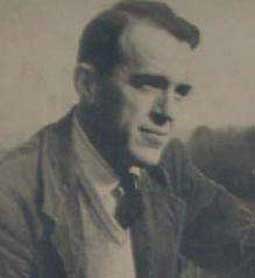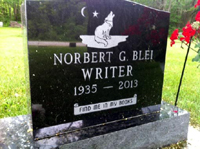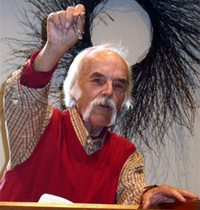


Poetry Dispatch No.88 | July 6, 2006
William Maxwell died in July, 2000.. He was a fiction editor at The New Yorker for much of his life. A shy, unassuming man, he preferred the background to the limelight. He also suffered to some extent that particular predicament of writers-who-edit: a perception that they edit because they can’t or chose not to write.
William Maxwell, however, was one of the twentieth century’s finest novelists and short story writers. I must admit I discovered his work late in my own writing career, long after I began to publish. But upon reading Maxwell’s beautiful novel, SO LONG, SEE YOU TOMORROW , his fables, THE OLD MAN AT THE RAILROAD CROSSING AND OTHER TALES, and his collected stories, ALL THE DAYS AND NIGHTS, I discovered how much I still had to learn.
The gentle Maxwell, an Illinois-boy who became a quintessential New Yorker, while never forgetting, or forgetting to write about the hometown, Lincoln, Illinois, was a good friend to many good and great writers.
The poem that follows comes from a collection of memories about Maxwell set down by Alice Munro, Charles Baxter, Shirley Hazzard, Richard Bausch, Donna Tartt, and John Updike, among others, who wrote “Stolen” for the editor, writer, and friend who mentored him through much of his writing life. Norbert Blei

Stolen by John Updike
Please go on being yourself.
—From my last letter from William Maxwell, July 28, 2000
What is it like, to be a stolen painting—
to be Rembrandt’s “Storm on the Sea of Galilee”
or “The Concert,” by Vermeer, both burglarized,
along with “Chez Tortoni” by Manet,
and some Degases, from the Isabella Stewart
Gardner Museum, in Boston, twelve years ago?
Think of how bored they get, stacked
in the warehouse somewhere, say in Mattapan,
gazing at the back of the butcher paper
they are wrapped in, instead of at
the rapt glad faces of those who love art.
Only criminals know where they are.
The gloom of criminality enshrouds them.
Why have we been stolen? they ask themselves.
Who has benefitted? Or do they hang
admired in some sheikh’s sandy palace,
or the vault of a mad Manila tycoon?
In their captivity, they may dream of rescue
but cannot cry for help. Their paint
is inert and crackled, their linen friable.
They have one stratagem, the same old one:
to be themselves, on and on.
The boat tilts frozen on the storm’s wild wave.
The concert has halted between two notes.
An interregnum, sufficiently extended,
becomes an absence. When wise
and kindly men die, who will restore
disappeared excellence to its throne?
from A WILLIAM MAXWELL PORTRAIT, Memories and Appreciations



























































Leave a comment